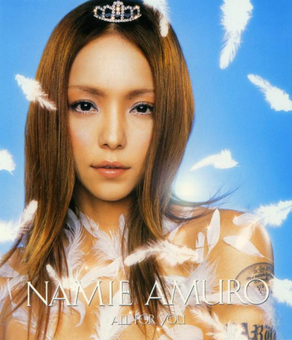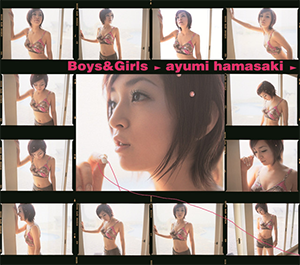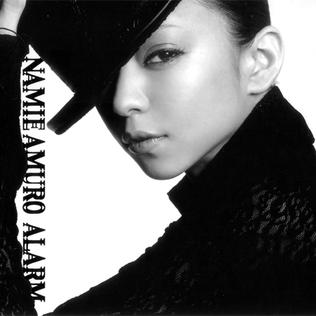
Ami Suzuki is a Japanese recording artist, DJ, and actress from Zama, Kanagawa, Japan. Having been discovered at the talent TV show Asayan, she was one of the most popular female teen idols in the late 1990s. However, in 2000, Suzuki faced legal problems with her management company resulting in a controversial blacklisting from the entertainment industry. Suzuki attempted to resurrect her career under her own steam with two indie singles before signing to Avex Trax in 2005. She released "Delightful", a dance song that reached No. 3 on the Japanese Oricon charts with a style similar to electronic club music, significantly different from her pop idol days. Since her appearance in the 2006 film Rainbow Song, Suzuki has gradually made a name for herself in the acting field, starring in various movies, television series, and musicals.

Around the World is the fourth studio album by Japanese singer Ami Suzuki. It marked her first release under the Avex Trax label. Ami released a single by the same name on the same day.

"All for You" is the 27th single by Japanese recording artist Namie Amuro. It was released on July 22, 2004, by Avex Trax, and serves as Amuro's second single from her seventh studio album Queen of Hip-Pop (2005). The lyrics were written by Natsumi Watanabe, who had translated "Stop the music" into Japanese for Amuro's 1995 single. The music was composed by Ryoki Matsumoto, known for composing other hit songs such as RUI's "Tsuki no Shizuku" and Mika Nakashima's "Yuki no Hana." Musically, "All For You" is a synthesizer-heavy power ballad.

"To Be" is a song by Japanese recording artist Ayumi Hamasaki. It served as the third single from Hamasaki's second studio album Loveppears (1999). The track was released by Avex Trax in Japan and Taiwan on May 12, 1999, and through Avex Entertainment Inc. worldwide in September 2008. It was Hamasaki's final single to be distributed as a Mini-CD, a format that debuted at the start of her career in April 1998. "To Be" was written by Hamasaki herself, while production was handled by long-time collaborator Max Matsuura. Musically, it is a J-Pop that was written in third person perspective, much like the content from the parent album.

"Boys & Girls" is a song recorded by Japanese recording artist Ayumi Hamasaki, serving as the fourth single for her second studio album, Loveppears (1999). It was released by Avex Trax in Japan and Hong Kong on July 14, 1999, and through Avex USA in North America in early 2001, while being re-distributed in 2003. "Boys & Girls" marks Hamasaki's first single to be made available for purchase as a maxi single with additional remixes. The track was written by the singer herself, while production was handled by long-time collaborator Max Matsuura. Musically, the song is a dance recording, a genre that heavily influences Loveppears. The single's lyrical content is written in third-person perspective.
"Eventful" is a song by Japanese recording artist Ami Suzuki, from her fourth studio album Around The World, first album under the Avex Trax label. Written by Suzuki and composed by Tohru Watanabe, it was released as her second single under the Avex label on May 25, 2005.

"Alarm" is the 26th single by Japanese recording artist Namie Amuro. It was released by Avex Trax on March 17, 2004, serving as the lead single to Amuro's seventh studio album Queen of Hip-Pop (2005). The song was written by Jusme and composed by Monk. The B-side "Strobe" was first planned as the main track of this single and when Amuro got the demo for "Alarm" the song was titled "Clock."

"Fantastic" is the sixth single released by Japanese singer Ami Suzuki under Avex Trax released on 8 February 2006, in three formats, the two traditional CD and CD+DVD edition versions with the B-side track, and a Limited Edition version without the B-side track.
Suzuki Ami Around the World: Live House Tour 2005 was the live house tour held by Japanese pop singer Ami Suzuki that supported her debut studio album in Avex, Around The World.
"Hopeful" is a song by Japanese recording artist Ami Suzuki, taken from her fourth studio album Around the World. The up-tempo, dance-pop song was written by Ami Suzuki (lyrics) and Shunsuke Yazaki (music).

"Shine More" is the 23rd single by Japanese recording artist Namie Amuro. It was released on March 5, 2003, by Avex Trax and serves as the second single from her sixth studio album Style (2003). It was originally written by Scott Nickoley, Sandra Pires and Paul Taylor, while the lyrics were translated into Japanese by H.U.B. Amuro called "shine more" the first part of a dance number trilogy including "Put 'Em Up" and "So Crazy."

"All Night Long" is a song recorded by Japanese singer Ami Suzuki for her debut studio album, SA (1999). It was written and produced by Japanese producer and songwriter Tetsuya Komuro. The track was released following Suzuki's two collaborative efforts with Komuro. "All Night Long" premiered on November 5, 1998, as the third single from the album.

"Free Free" is a song by Japanese recording artist Ami Suzuki and producer Yasutaka Nakata, taken from her sixth studio album Dolce (2008). It was released on August 22, 2007 through Avex Trax and was distributed into three physical formats and for digital consumption. Additionally, the track appeared as a double A-side to "Super Music Maker", another recording by Suzuki and Nakata. Suzuki first started working with the producer in late 2006 after her staff at Avex noticed the singers engagement with dance-oriented music whilst performing at night clubs, and wanted to pair her with a musician that dealt with electronic dance music.

Dolce is the sixth studio album Japanese singer Ami Suzuki. Avex Trax released it in Japan on February 6, 2008, in a variety of formats. Max Matsuura executive produced Dolce, and is the second and final instalment of her "Join" series, which follows her previous album Connetta (2007). The "Join" series features a number of different producers and artists who worked together on various tracks from the album and appear as featured artists. Musically, Dolce is an upbeat dance record with house and j-pop influences.

"One" is a song recorded by Japanese recording artist Ami Suzuki for her seventh studio album, Supreme Show (2008). It was written and produced by Japanese producer and Capsule member Yasutaka Nakata. The track is Suzuki's third single with Nakata after her August 2007 single's "Free Free" and "Super Music Maker". "One" premiered on June 18, 2008, as the lead single from the album.

"Can't Stop the Disco" is a song recorded by Japanese recording artist Ami Suzuki for her seventh studio album, Supreme Show (2008). It was written and produced by Japanese producer and Capsule member Yasutaka Nakata. The track is Suzuki's third single with Nakata after her June 2008 single "One". "Can't Stop the Disco" premiered on September 24, 2008 as the second single from the album.

Supreme Show is the seventh and most recent studio album by Japanese singer Ami Suzuki. Avex Trax distributed it in CD and DVD formats on November 12, 2008. It was released ten months after her previous studio album, Dolce, and was promoted to commemorate the singer's tenth career anniversary. Yasutaka Nakata, who had previously appeared as a featured artist and produced on Dolce, handled the album in its entirety. Crafted to re-invent her sound and image, Supreme Show is an electronic album with additional dance notes, and includes tracks in English and Japanese language.

"Reincarnation" is a song by Japanese recording artist Ami Suzuki for her second greatest hits album, Ami Selection (2011). It was written by Emi Hinouchi and produced by Taku Takahashi. It was Suzuki's first collaboration with both Hinouchi and Takahashi. It premiered on February 25, 2009, as the lead single from the album. The CD and digital cover sleeve has a close-up of Suzuki hovering a CGI bubble. The DVD cover sleeve features a slightly altered version of it.

Ami Selection is the second compilation album by Japanese recording artist Ami Suzuki, and her first released on the Avex label. It was released on December 7, 2011.

"Super Music Maker" is a song recorded by Japanese recording artist and songwriter Ami Suzuki, for her sixth studio album Dolce (2008) and a re-recorded version for her seventh album Supreme Show (2008). Featuring Japanese record producer and Capsule member Yasutaka Nakata, the song was released as the lead single and double a-side single with "Free Free" from Dolce on August 22, 2007 through Avex Trax. Nakata had written, produced and arranged both tracks and is her first single to be handled by Nakata following later singles from her album Supreme Show (2008). Backed by synthesizers and keyboards, "Free Free" incorporates a new genre called "Eropop" with influences of electronic dance, house and disco music. The lyrical interpretation was based on the theme of erotica and freedom.















